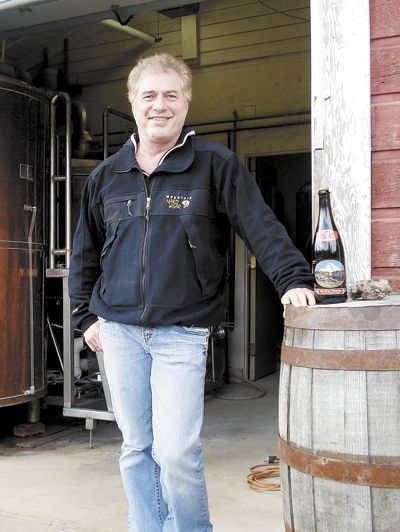Wine-Minded Ales


By Mark Stock
If Michael Pollan, author of “The Omnivore’s Dilemma,” is responsible for reacquainting our hunger with our consciousness, then wine culture must be credited for Oregon beer’s current obsession with freshness, nuance and careful craftsmanship.
Other factors preside, of course, the main being our uncanny geography, wherein an entire galaxy of ingredients basks in pure soils and even purer rains. But the relationship between brewing and winemaking has always been an especially flirtatious one thanks to shared processes, equipment, additions and locations.
Yet, now more than ever, local beer is being treated more and more like fine wine in every facet.
Brewers are walking hop rows pre-harvest like a winemaker studies his fruit just before crush. They’re including old Pinot Noir barrels in their oaking regiments and are staunch supporters of sustainability and seasonality. They’re playing with new yeast strains and bottle-conditioning ales, so they can evolve for years to come.
What ends up in the bottle, by and large, is the accumulation of the same sensitivity and selectivity we’ve thrown at food since we broke up with industrialization and fell back in love with flavor. Old ideas, re-fermented.
THE FARMHOUSE
“The cows know when I’m brewing beer, and they love it.”
David Logsdon is pointing at two Scottish Highland bulls that chew on spent barley, oats and wheat every time a new batch is underway. The shaggy cattle look like Muppets, cartoonish and content.
A founding member of Full Sail’s brewing force, Logsdon has since left the giant tanks and interstate views for a quaint red barn set in the foothills south of Hood River. His label, Logsdon Farmhouse Ales, is a reflection of its setting, literally and figuratively. The green expanses and orchard rows pictured on the bottle are spot-on. Mt. Hood, with its perfect posture, commands the background.
About the only thing giving this place away as a brewery and not a lovely Alpine-like retreat is the sweet, bakery-esque smell of wort — the liquid extracted from the mashing process during the brewing of beer. It’s not until Logsdon opens the barn door that the brilliant copper hues of brewing equipment appear. About 1,000 barrels of Belgian-style farmhouse beer are produced here per year, including a wit beer and a peach-infused beer, among others.
Originally crafted for thirsty farmhands in Europe, these beers model age-old techniques while entertaining new local ingredients. Logsdon takes pride in his hop selections, always whole and raised by organic growers nearby. “We want good flavor,” he said, “so we must make the extra effort.” Logsdon’s flagship Seizoen ale uses four different yeast strains for length and roundness. Many brewers struggle with just one.
Logsdon counts on brettanomyces for structure and flavor in many of his beers. The yeast strain is used in beer and less so in wine and occurs naturally in certain types of wood. It can produce earthy flavors and must be appropriately balanced so as not to overwhelm its domain. The strain is applied in the secondary phase, or subsequent fermentation, and requires a sugar source to get revving while in the bottle. Logsdon adds pear juice from neighboring orchards as a finishing touch to many of his beers. But that’s only the beginning.
“Some will last 20 years if stored properly,” he said, squinting as a rare sliver of sunlight shone on his farm. Like wines, these beers will evolve, acquiring new characteristics as they age. Residual sugar and yeast will mingle in the bottle, creating new flavors, textures and added carbonation. And just when his current Farmhouse Bretta is starting to peak a few years from now, Logsdon’s cherries — sourced from the Flanders region of Belgium and planted on his estate — will start producing a new ingredient for his ales.
Widely considered to be the most wine-like of beers, the Flanders Red Ale is something Logsdon is looking to perfect. His version is called the Far West Vlaming, an organic tart red ale aged in oak barrels. Logsdon brews it with several yeasts and lactic bacteria, affording it a bright, sour characteristic with a woody finish. Per Belgian tradition, the aged beer is blended with young beer to create a balance. Logsdon’s newest batch, available soon, is remarkable, sweet up front with cherry cola flavors and stemmy, grassy notes.
In the pursuit of unique flavors, Logsdon employs another technique familiar to winemakers. He presses would-be spent hops for an extra gallon or so of highly flavored juice. A bit like combining free-run juice with more extracted, pressed juice in winemaking, this practice imparts heft and concentration in the finished product.
THE URBAN CELLAR
At Upright Brewing in Portland, Alex Ganum is cleaning out old kegs and filing paperwork. He also brews beer, arguably some of the finest locally of its genre. Saison on the surface, Upright beers draw from classic French and Belgian influence as well as all-American invention, even trial-and-error. The name refers to the late jazz wizard Charles Mingus, who artfully blended the traditional with the improvisational in his many compositions.
Ganum’s workspace — located in the basement of the Leftbank Annex near the Rose Quarter — resembles a cellar, filled with barrels, beakers and pumps. The finished beers even look like wine, bottled in 750-milliliter vessels dressed in gorgeous labels. And the ingredients are often as colorful as the labels, including seasonal edibles like oysters, coriander and yarrow flowers.
Citing food as a major muse for his brewing methods, Ganum is constantly translating the sensory world into the language of beer. A trip to the herbarium, or a bit of bay laurel plucked from a neighbor’s yard, he mentioned, can be powerful motives for a new Upright beer. He relies on family hop farms — such as the Annen Brothers in Mt. Angel — much like a winemaker relies on family vineyards, commending their personable nature and tremendous crop.
Terroir, naturally, exists in the beer realm as well. Ganum is still mystified by a hop sampling he experienced a while back. Six or seven hops of the same Cascade varietal but from different growing sites were arranged on a table for consumption. “The differences were staggering,” Ganum said, “I’ve never looked at ingredients and recipe formulation the same since.”
Upright’s savoring the fortunate state so many small labels — wine or beer — enjoy. Their standard lineup is great and has developed a cult following. But the really experimental stuff lies in Ganum’s many season micro-batches or one-off attempts. His Fatali Four, for example, is a workout routine for the palate, displaying notes of ginger, brine, dried fruit and lemon-lime soda. The barrel-aged beer was fed Fatali chiles and minimal brettanomyces yeasts.
Ganum experiments with test brews on his own. Last year, he produced a single cask spin-off of Upright’s Fantasia. In many ways, it’s a Lambic made with 100 pounds of Baird Family Orchards peaches. He topped the beer with bulk white wine from Witness Tree Vineyard in Salem. The result is a bizarre, honey-colored beer with a floral nose and a bitter, musky flavor profile. “Certainly not for everyone,” Ganum said, “but fun if you like that sort of thing.”
Which is the point, really. An entire spectrum of ingredients and methods waiting to be chosen, with the only governing body being a fairly loose set of philosophies put forth by founding brewers and winemakers ages ago.
Mark Stock, a Gonzaga grad, is a Portland-based freelance writer and photographer with a knack for all things Oregon. He currently works at Vista Hills Winery in Dayton.
FINDING THE WINE-MINDED
Upright Brewing
240 N. Broadway, No. 002, Portland
www.uprightbrewing.com
Old World techniques with New World recipes with resounding yeasty, floral profiles.
MUST TRY: The Seven, a refreshing ale with intense aromatics and a spritzy backbone.
Logsdon Farmhouse Ales
4785 Booth Hill Rd., Hood River (appointment only)
www.farmhousebeer.com
Fine farmhouse beers in a genuine farmhouse setting.
MUST TRY: The Peche ‘n’ Brett, with its citrus spike, earthy undertones and full character.
Cascade Brewing
939 S.E. Belmont St., Portland
www.cascadebrewing.com
The epicenter of sour and wild beers (native yeast fermentation), set in Southeast Portland.
MUST TRY: The Vine (2011), a Northwest-style sour beer re-fermented with the aid of white wine and aged in used Pinot Noir barrels.
The Beer Mongers Bottle Shop
1125 S.E. Division St., Portland
www.thebeermongers.com
Portland’s most welcoming bottle shop and taproom, just outside of Ladd’s Addition.
MUST TRY: Anything Sam or Sean suggests. The crew has tasted everything.










